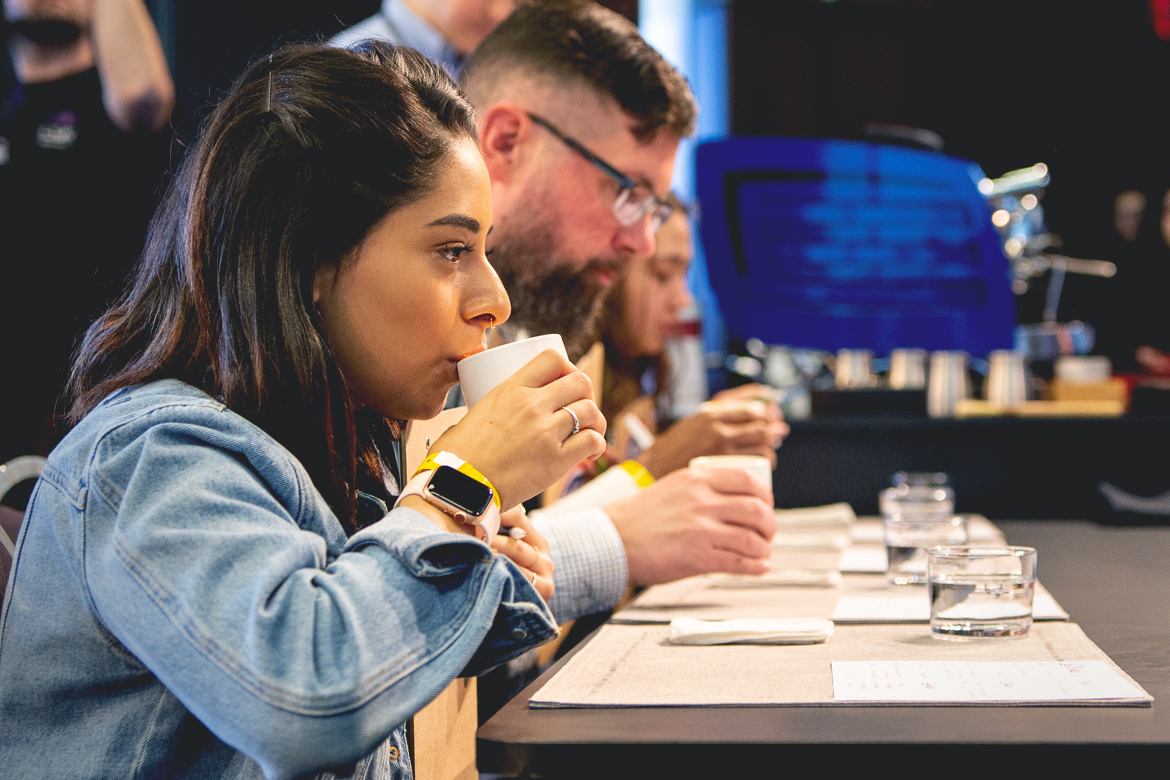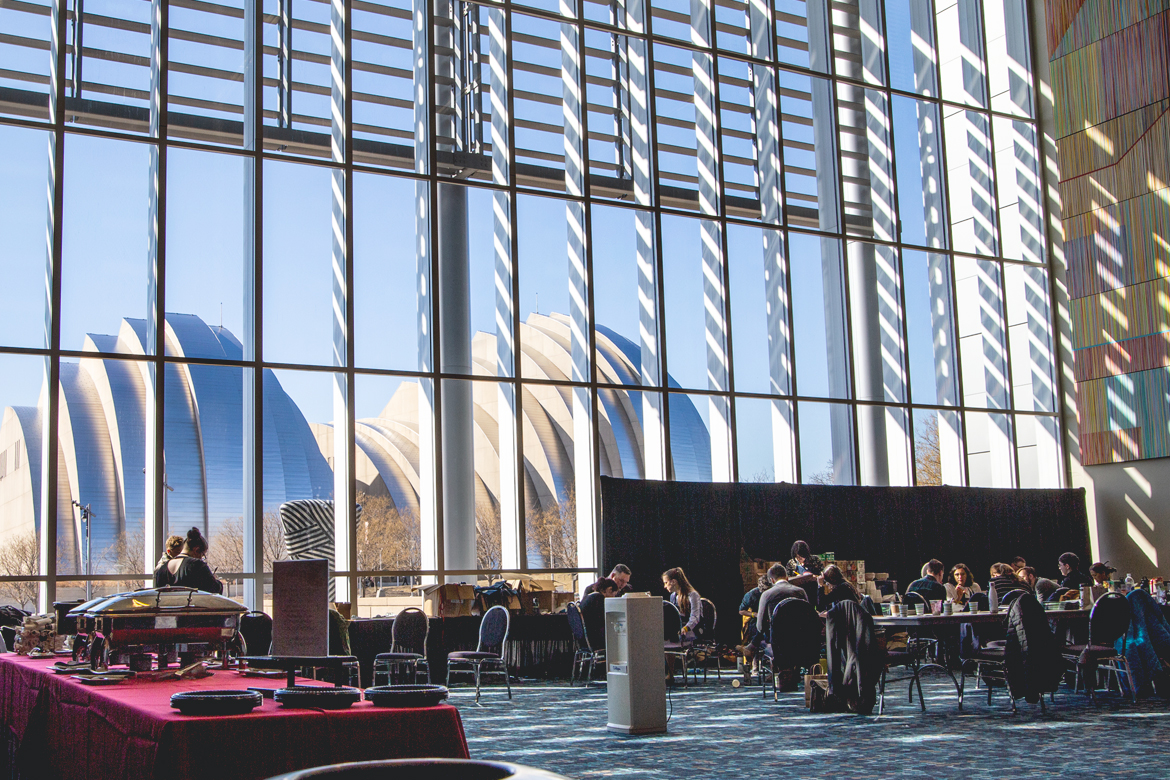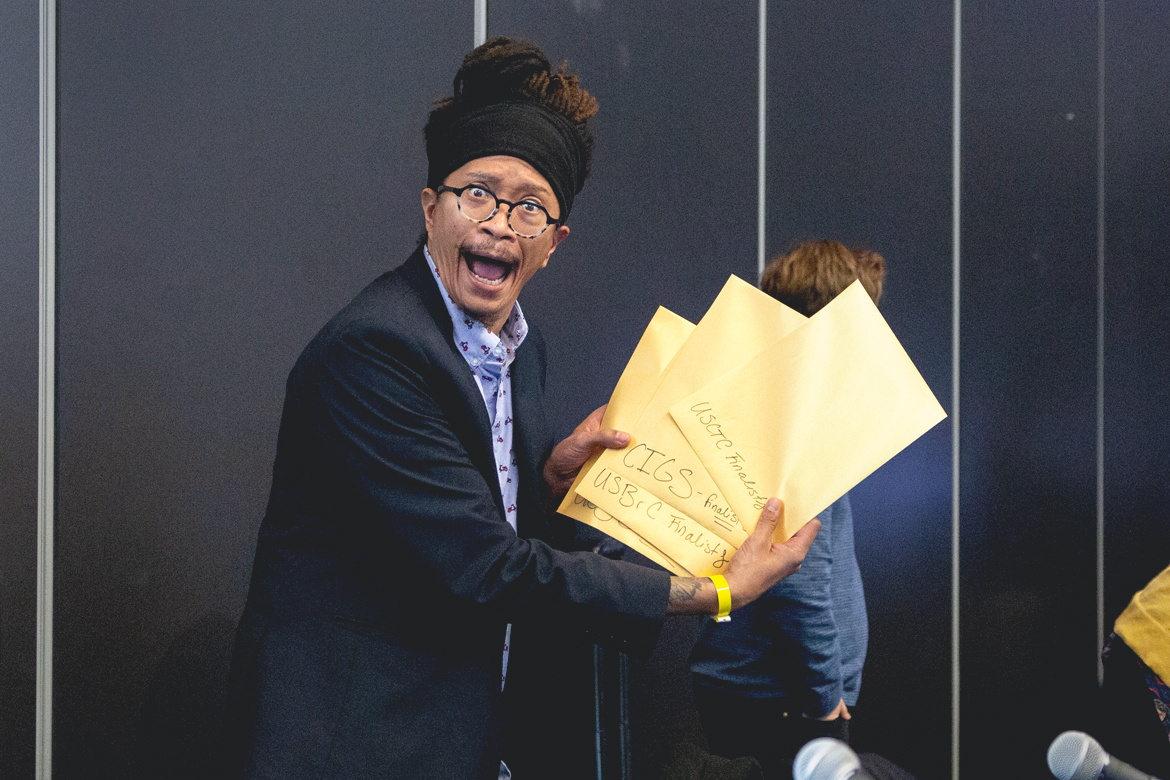Day One at the 2019 US Barista Championship here in Kansas City, Missouri is in the books, and if today’s performances are any indicator, we’re in for a treat the next two days. We’re not even into the Semi-Finals and we’ve already seen a number of super polished routines capable of earning a Reg Barber tamper trophy, if not the biggest one of the all.
All of today’s competitors earned their spots via one of two Qualifying Events, held in Denver and Nashville a few months back (with the exception of Cole McBride, the 2018 USBC Champion whose win last year earned him a bye into Nationals). But things are a little different now that we are at the Big Show. Competitors must now complete three drink courses: espresso, signature beverage, and the oft under-appreciated milk beverage course. (I can just taste those carrot cake and Bit O’ Honey and shortbread cookie flavor notes called during the milk course.) For their trouble, they will be given an extra five minutes, upping the routine time to 15 minutes from the 10 of previous rounds.
And after it was all said and done, six competitors are moving on to do it all over again tomorrow, joining the other 12 coffee professionals who earned byes via Qualifying Events. But let’s take a look back at all the action from Day One, if only to prepare us better for what’s to come. The action is only going to get hotter and heavier from here.
SprudgeLive’s coverage of the 2019 US Coffee Champs is made possible by Joe Glo and Mahlkönig. All of SprudgeLive’s 2019 competition coverage is made possible by Acaia, Baratza, Faema, Cafe Imports, and Wilbur Curtis.
Ali Abderrahman, State Street Coffee/La Reunion, Dallas, TX
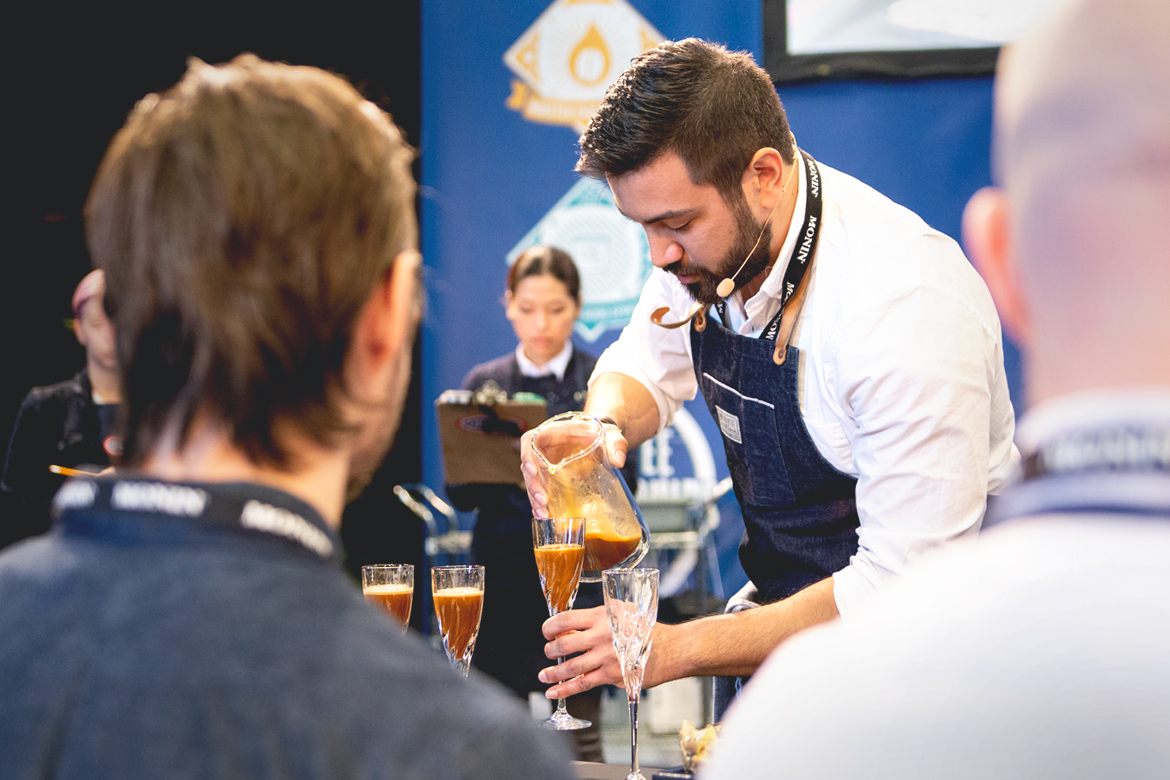
And here we go! Our first competitor here at @uscoffeechamps is Ali Abderrahman of State Street Coffee/La Reunion in Dallas, TX
Abderrahman is competing with a coffee from the Othaya Farmers Cooperative Society in Nyeri, Kenya. It’s a AA coffee made up of SL28, SL34, and Ruiru 11.
We’ve heard a lot of flavor calls over the years of covering coffee competitions, but I believe Abderrahman is the first person to ever describe an espresso’s texture as “suede”.
“It’s something I’d be proud to serve my mom today.” — Abderrahman says after recalling the first capp he ever made: for his mom who brought home an espresso machine when he was 10.
Sig bev for Abderrahman is inspired by the Gura River in Nyeri, used to double wash the coffee. Lime juice, press pressed ginger, brown sugar jasmine green tea infusion, and egg white all get shaken together.
Elisabeth Johnson, Venture Coffee Co, Seattle, WA
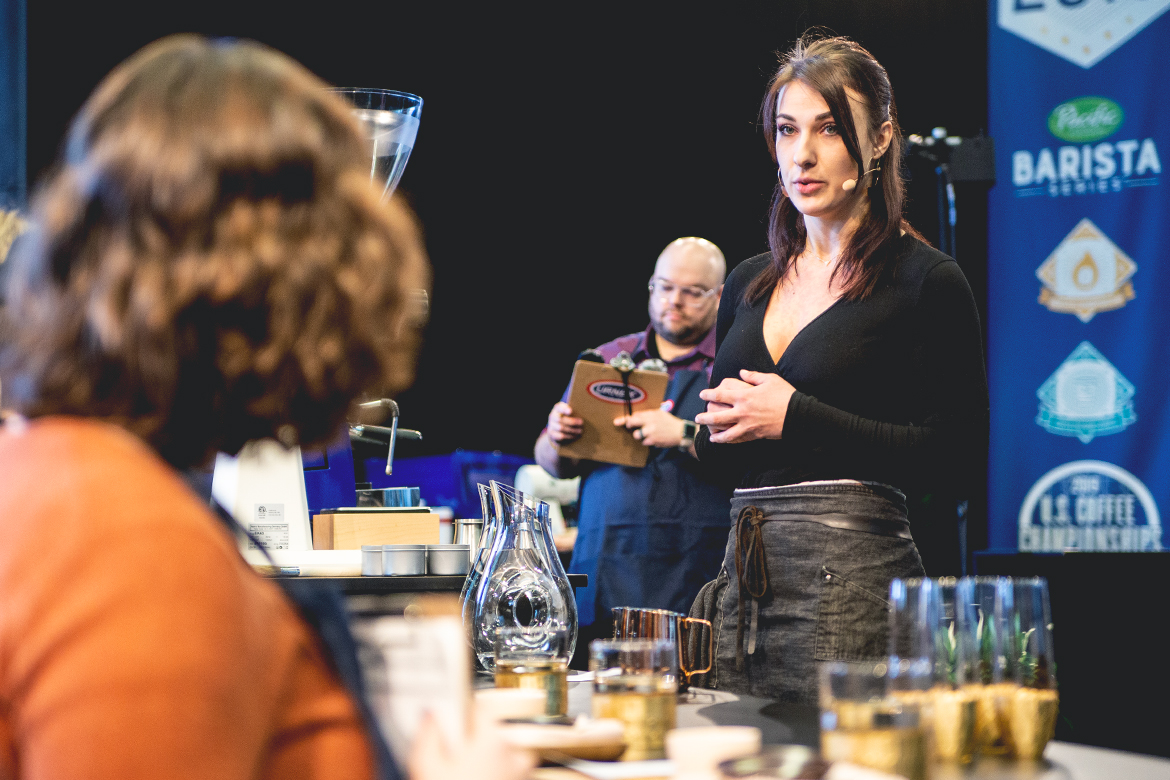
“I have a personal motto: ‘learn more, do more, be more.'” — Elisabeth Johnson of @VentureCoffeeCo
Johnson is competing with a natural processed Java variety coffee grown in the Colombia’s Trujillo Valle.
“The difference between being a barista and being a professional barista is like the difference between exercising and being an athlete.” Really enjoying this metaphor by Johnson.
Notes of naval orange, black cherry, and 70% dark chocolate in Johnson’s Finca la Julia espresso course.
We’re only two competitors in and I’m already in love with these milk beverage flavor calls. For Johnson, it’s apricot cream and milk chocolate.
For her sig bev, Johnson is taking those chilled spros and adding sarsaparilla syrup, cashew milk, and montmorency sour cherry juice, giving them all a nitro charge.
Ben Vollmar, Flatlands Coffee, Bowling Green, OH
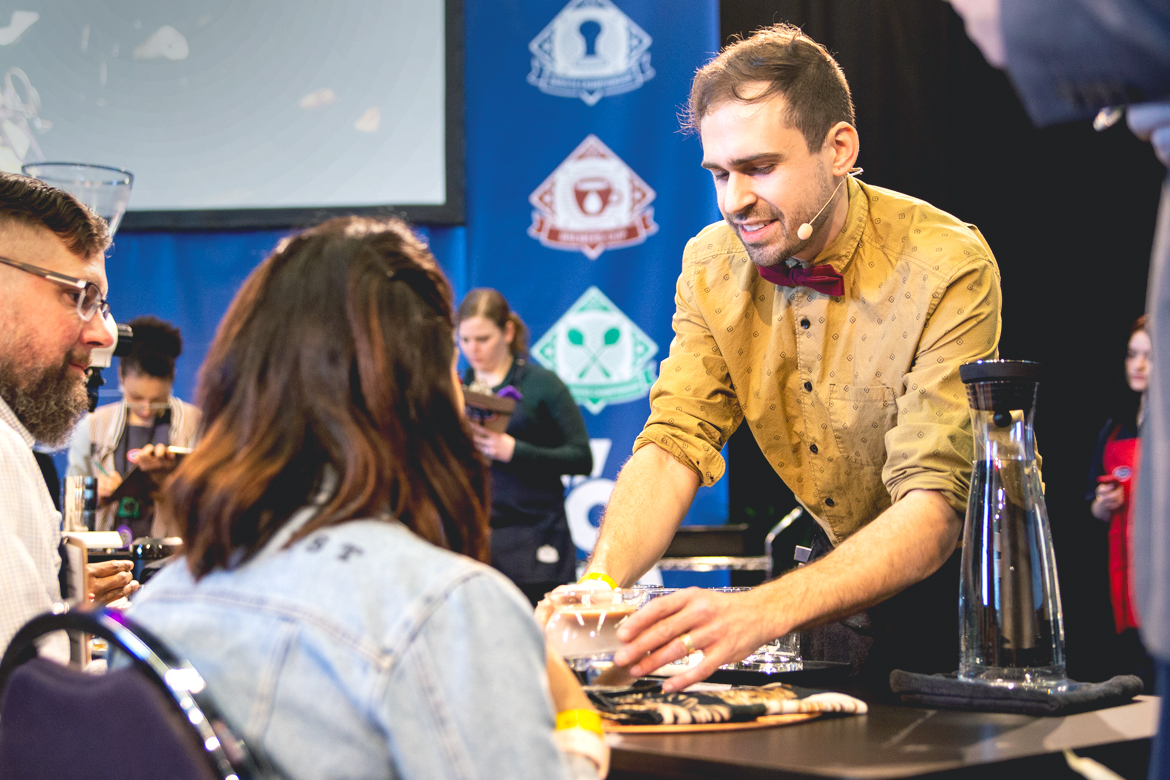
Our previous two competitors kept a clam demeanor, but @bvollma is much more excited. He’s bring a big energy to the #uscoffeechamps stage.
For his espresso course, @bvollma uses a blend of SL28 and SL34 varieties from Mount Kenya, having notes of tart cherry and lime, caramelized sugar, orange rind, and dry hazelnuts
For his milk course, @bvollma switches coffees to a 50/50 natural and wash processed coffee from the Hambela estate in Ethiopia.
We’ve got bespoke milk. @bvollma worked with a dairy, who customized the cows’ diet specifically for his comp milk. It’s all oats and sunflower seeds for these happy bovine. No soy beans.
Cappuccinos for @bvollma have notes of blueberries and “airy milk chocolate ice cream.” I’m not entirely sure what that means, but I love it.
.@bvollma is switching up his coffees once more for his sig bevs. Caturra and castillo varieties from Colombia soaked in a sugarcane bath.
Kristi Persinger, Stumptown Coffee Roasters, Los Angeles, CA
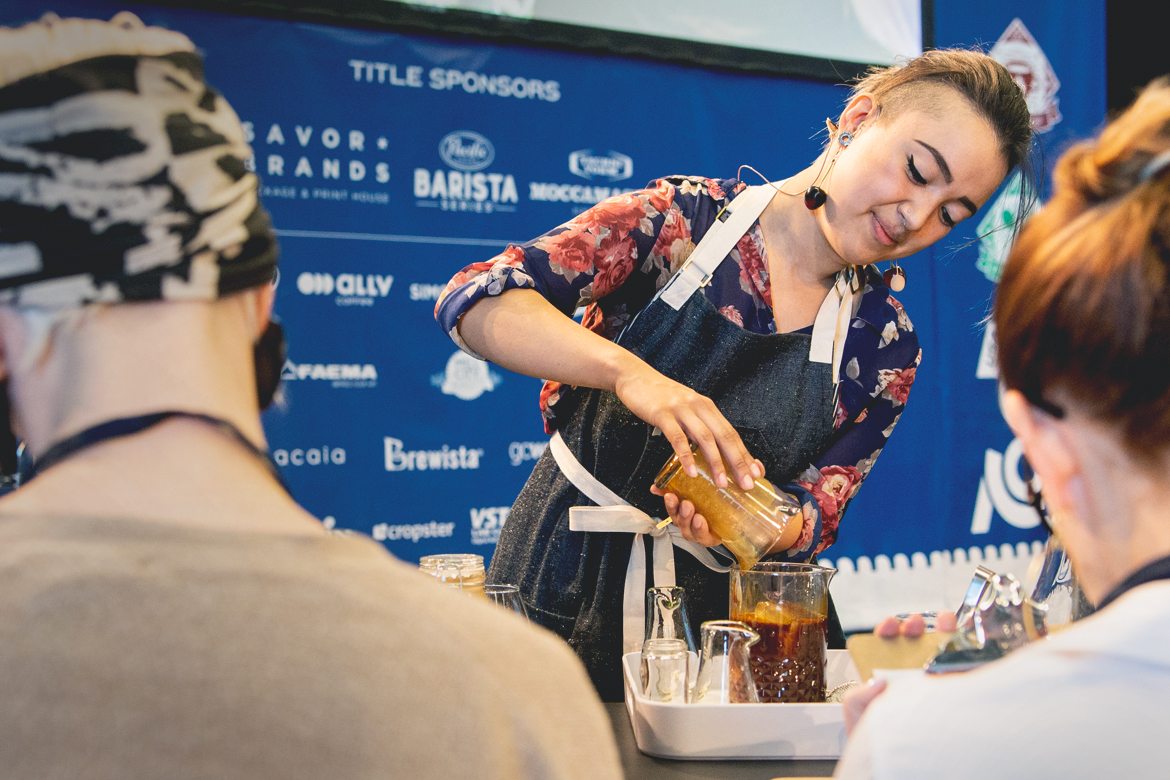
“The coffee industry is full of smoke and mirrors distracting us from what’s really going on.” — Persinger’s routine will focus on the current commodity coffee price crisis.
After having some apron issues, Persinger is back on track and into her espresso course, today using a wash processed coffee from the Suke Quto farm in Ethiopia’s Guji Zone, grown between 1800-2200MASL.
Black tea, fresh lime, and semi-sweet chocolate chip notes in Persinger’s Guji espresso course.
Persinger is the first competitor of the day to use the milk course for something other than a cappuccino. 1.5oz of milk in the macchiatos with notes of marshmallow fluff, chocolate ice cream, and butter caramel.
For her sig bev, Persinger is using a ginger honey simple, chilled cascara tea, sparkling pea black tea, and Suke Quto espresso, all stirred together and strained. The drink is finished off with dry ice and water, an allusion to the “smoke and mirrors” from earlier.
Austin Amento, Augie’s Coffee, Redlands, CA
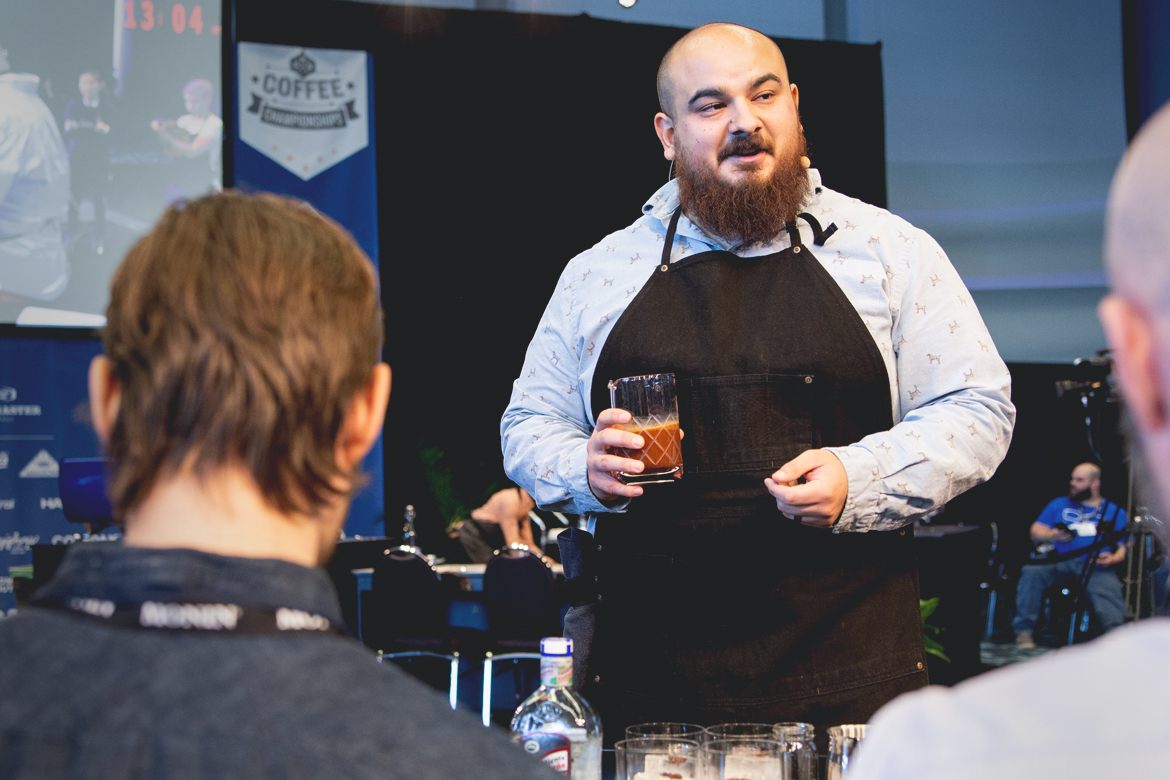
Using a coffee currently being served on bar this very day at @AugiesCoffee, Amento competes with a Castillo and Colombia variety blend grown at 1930MASL on Finca El Paraiso in Cauca, Colombia.
Ripe strawberry, plum, red grape, and a white wine acidity in the Colombia espressos for Amento.
For his milk course, Amento’s drink—stirred 6 times—has notes of dark chocolate, rum cake, cherry ice cream, and fig newton.
Sig bev for Amento includes citric acid solution, chilled espresso, cocoa nib syrup, and anaerobically fermented strawberry puree.
Before drinking the sig bevs, judges have been instructed by Amento to pour a shot of aguardiente over dry ice, releasing an anise aroma.
Anthony Ragler, Counter Culture Coffee, Brooklyn, NY
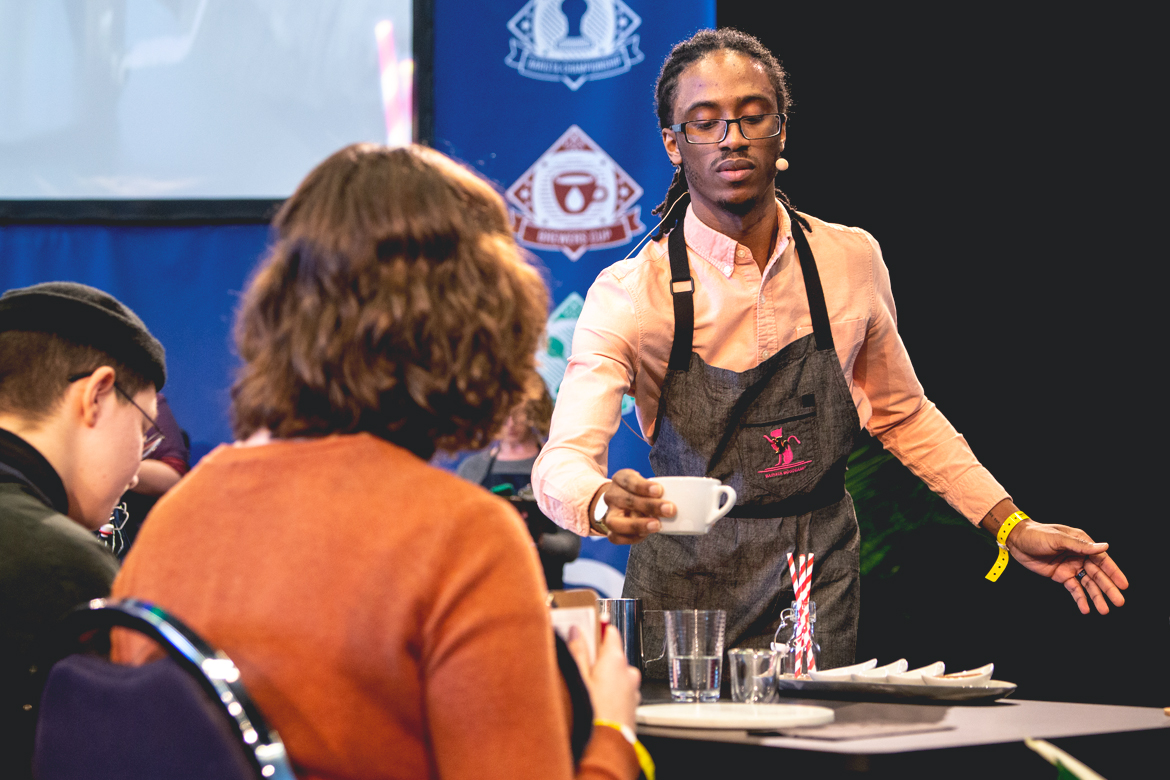
“People will forget what you say, people will forget what you’ve done, but people will never forget how you make them feel” — Ragler begins his routine with a Maya Angelou quote.
There’s a lot of power both in Ragler’s words and delivery in the early part of his routine. BRB, gonna stop tweeting and just listen for a bit.
Really cool coffee today for Ragler (and frankly, one I’ve never heard of before): a natural processed coffee from Burundi, produced by Ramadhan Salum.
Pink grapefruit, blackcurrant, and black cherry in Ragler’s natural Burundi espresso course.
“High quality can be achieved with sacrificing relatability” — Anthony Ragler on why he opted to use Horizon brand milk, available at most grocery stores.
There’s just so much to unpack in Ragler’s performance. I don’t want to tell you you should stop following along with us here at SprudgeLive, but you should really watch his run on the Livestream.
Sig bev for Ragler is based on a soda, specifically a Dr. Pepper. Cinnamon, star anise, and vanilla are steeped in distilled water and then chilled and mixed with espresso.
Cris Mendoza, Saint Frank Coffee, San Francisco, CA
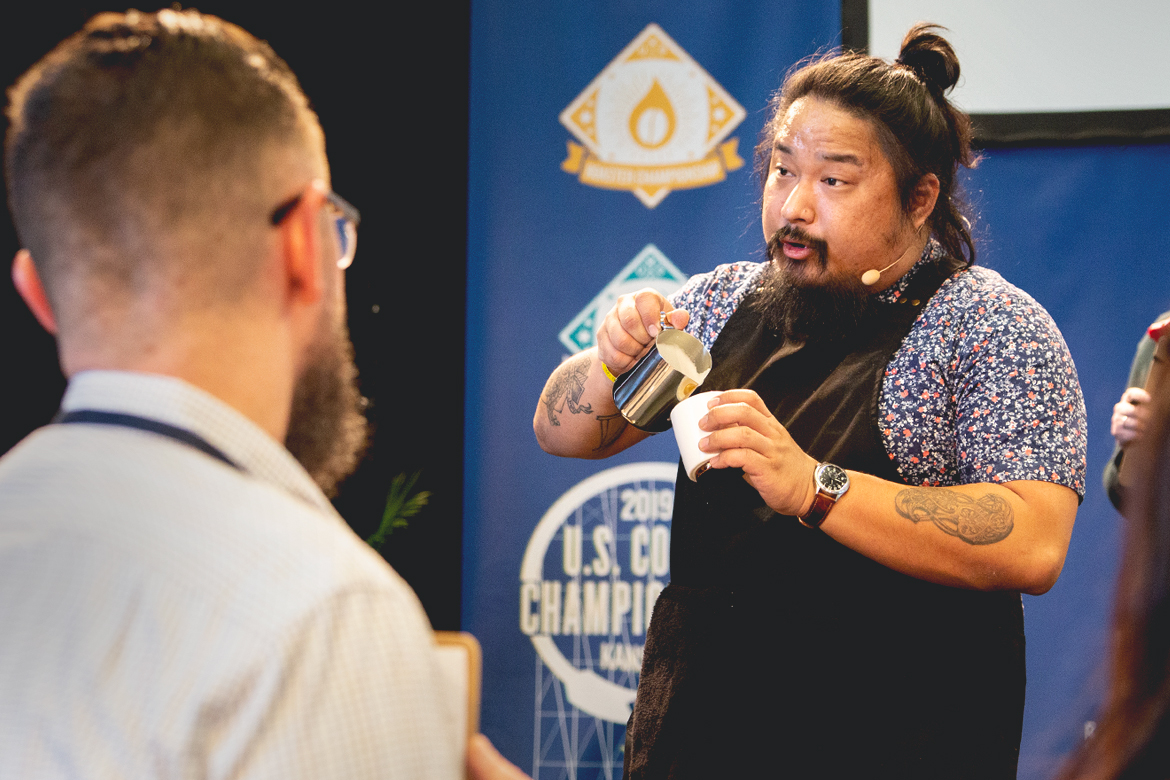
“Good coffee never happen in isolation. And great coffee is collaborative” — @crisjmendoza of @StFrankCoffee
.@crisjmendoza is currently grinding his super-frozen coffee. The technique hasn’t even made it to his script yet. A few years ago, it was the central them of @Kyle_Rampage‘s winning USBC routine. What a difference a few years make.
.@crisjmendoza competes today with a Pacas-dominant blend grown at 1640-1670MASL in Santa Barbara, Honduras.
Notes of apricot, golden delicious apple, juniper, and bitter blood orange in Mendoza’s Honduran espresso course.
Every milk course sounds like dessert. For @crisjmendoza, the dessert menu includes tasting notes of fluffy angel cake, toasted almond, and shortbread cookie.
Chilled espresso, maple molasses syrup, and Oleo-Saccharum all blended together for Mendoza’s sig bev.
Morgan Eckroth, Tried & True Coffee Co, Corvallis, OR
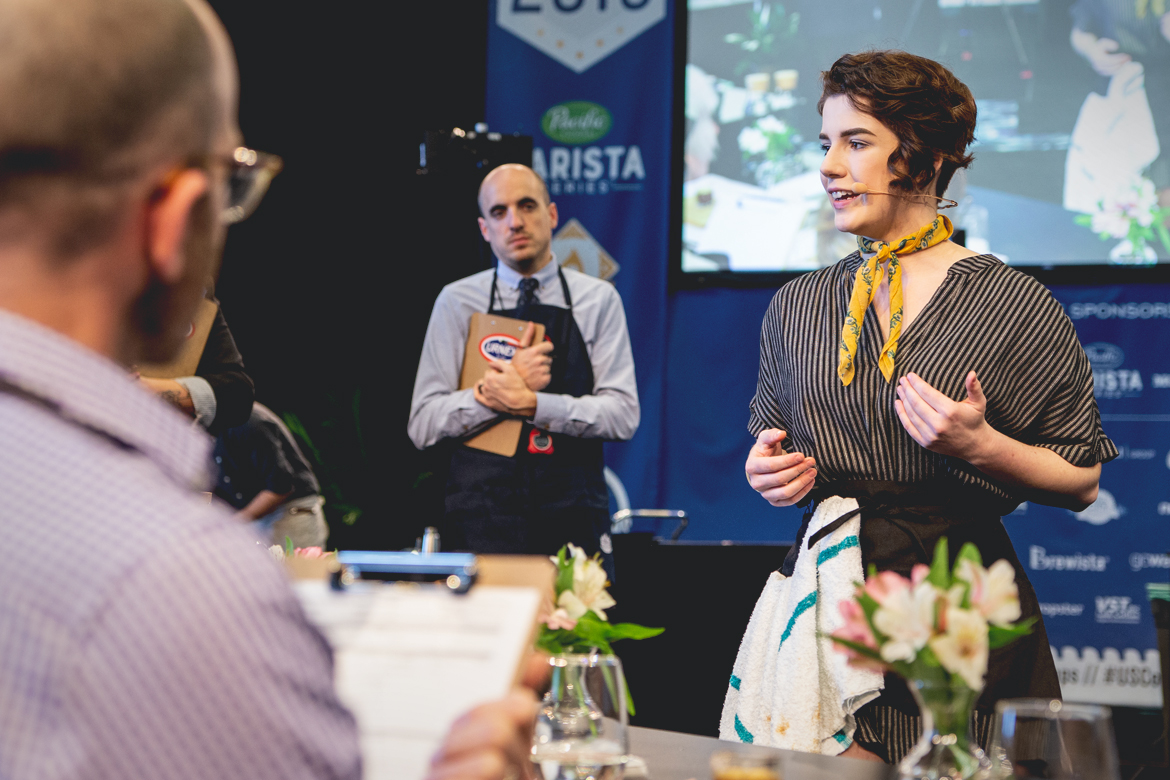
Eckroth competes today with a coffee from the esteemed Hacienda La Papaya in Ecuador, winner of a 2018 Sprudgie.
Eckroth’s La Papaya coffee grown by Juan Peña includes typica, pacas, and caturra varietals and was roasted by @BespokenCoffee
“Coffee cannot and should not be faceless” — Morgan Eckroth of @TNTCoffeeCo
Honey sweetness, green apple acidity, and dark chocolate finish in Eckroth’s Ecuadorean espresso course.
For her sig bev, Eckroth incorporates Darjeeling black tea ice cubes, fresh apple juice, apple cider vinegar, coffee blossom honey, and rose water along with her La Papaya espresso, shaken and strained.
Milo DeGoosh, Bard Coffee, Portland, ME
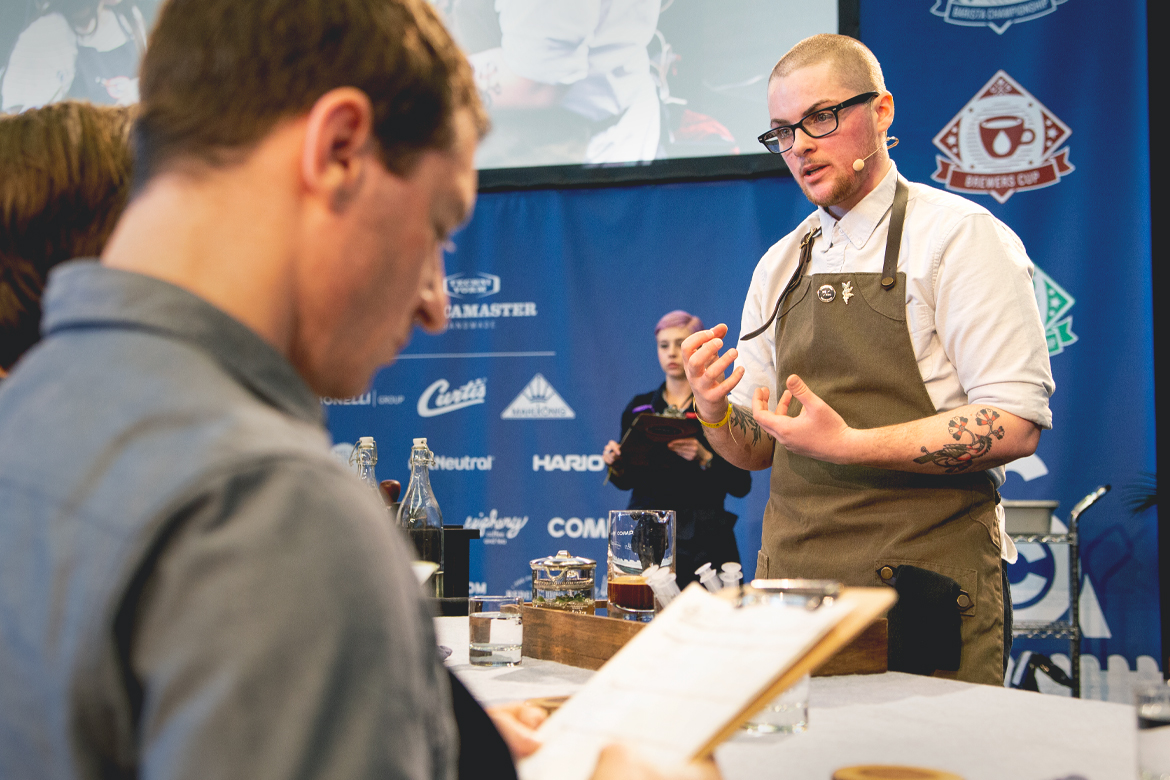
DeGoosh competes with a Perla Negra natural processed coffee grown by Oscar & Francesca Chacone on Finca Las Lajas in Costa Rica.
The Las Lajas espresso for DeGoosh expresses notes of Mandarine orange, cherry, cranberry, cacao nib, and bright, tart, summery rosé.
I would also like to express my interest in a bright, tart, summery rosé.
Black cherry, hazelnut, and chocolate ice cream with a drying finish reminiscent of an almost skin for DeGoosh’s cappuccino course.
These milk course flavor calls are so wild, y’all. *ALMOND SKIN* I love it so much. I missed you, milk course.
Whey, pineapple syrup, sage-infused soda water, and espresso for DeGoosh’s sig bev course today at #uscoffeechamps
Reef Bessette, The Coffee Movement, San Francisco, CA
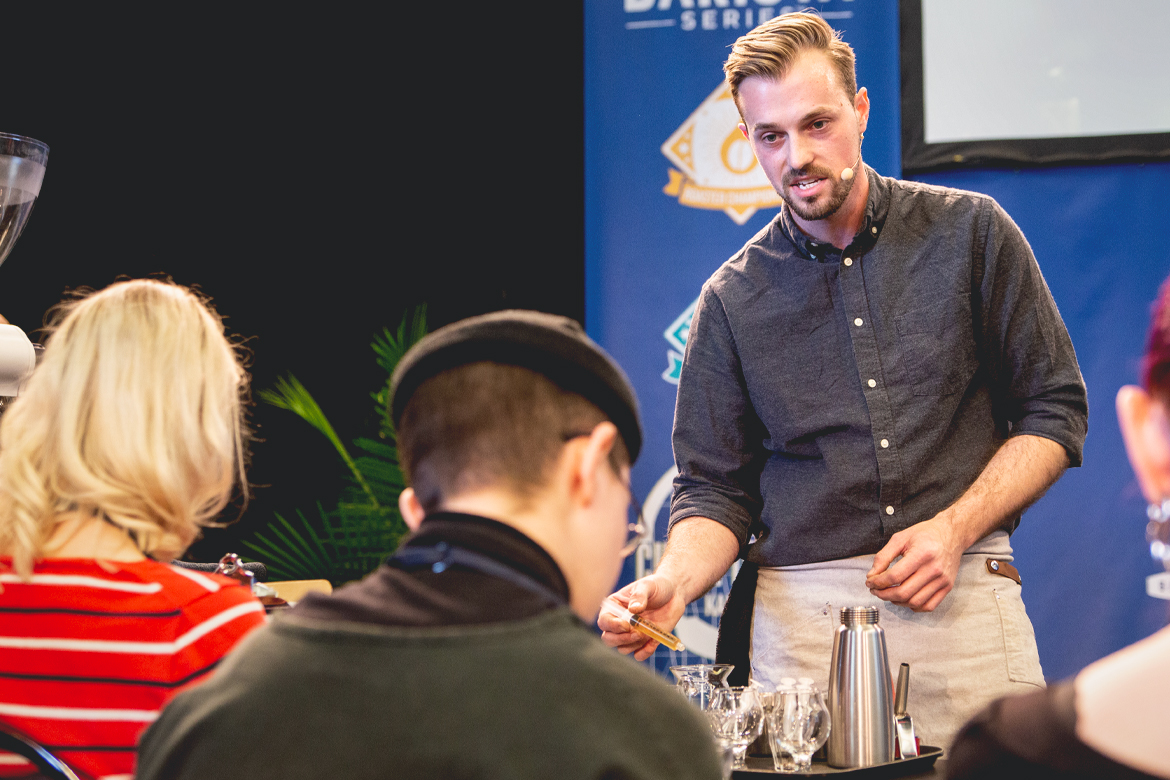
Bessette competes today with a Parainema variety coffee grown by Benjamin Paz in Santa Barbara, Honduras.
Stirring for the judges using a chilled spoon, Bessette’s espressos have notes of honey, raw cashew, yellow apple, with an elderflower finish
Bessette hand-sorted his Laguneta coffee, separating the Parainema from the Caturra.
Light molasses syrup, tartaric acid solution, and a juniper berry tea concentrate all get nitrous charged for Bessette’s sig bev course.
3:1 milk to coffee ratio, Bessette’s milk bev has notes of tart cherry, milk chocolate, and a graham cracker crust finish.
Meg Skop, Equator Coffees & Teas, San Rafael, CA
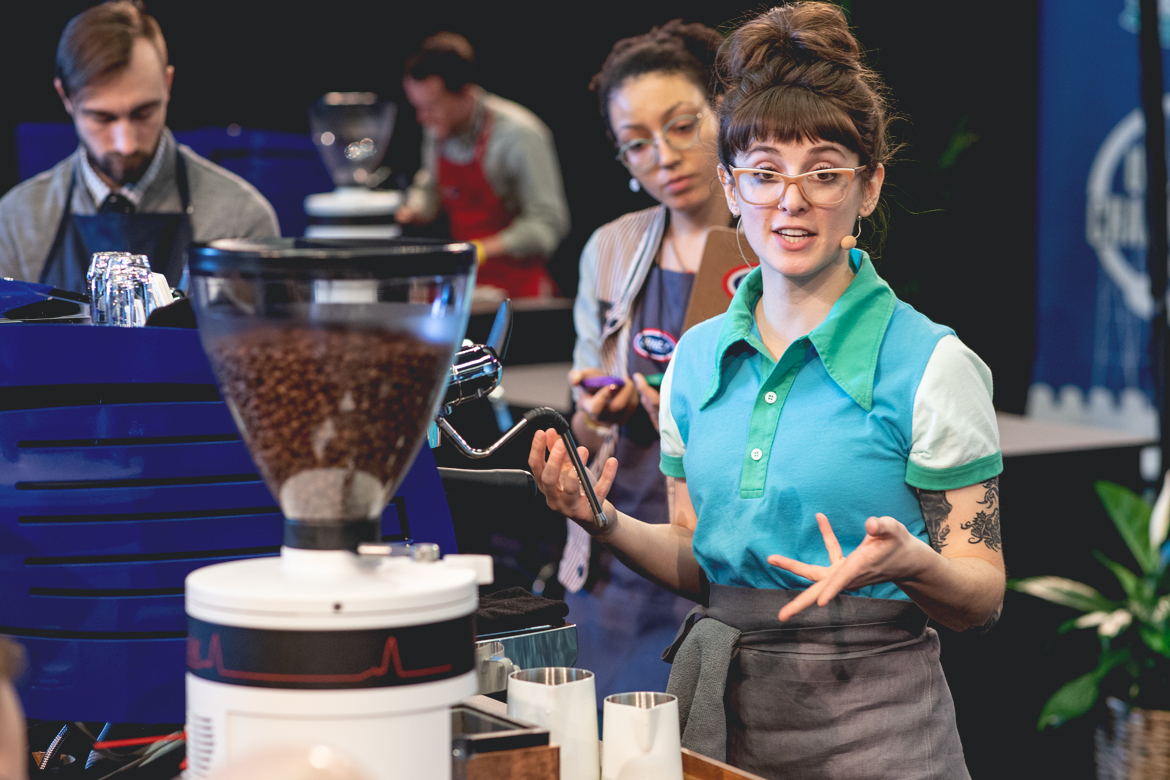
Meg explores how temperature affects coffee flavor, tying diurnal temperature changes to sweetness. Usually these variations are the most distinct at high elevations, but Meg’s coffee is grown at a “scant 400 masl”.
Vibrant, juicy, washed process, Gesha variety, from Hawaii, medium sugarcane sweetness, high pineapple acidity, medium guave bitterness, creamy buttery texture, lingering cacao finish.
Meg is very purposeful in her movements. Because her espresso has a delicate flavor, she pulled a shorter espresso shots, increasing the viscosity to create a harmonious relationship.
Meg’s milk from a small dairy, only 30 cows! Milk drinks with notes of butterscotch, caramel macadamia nut and a toasted coconut finish.
Skop prepares her final espresso to the strains of Tame Impala, “This coffee is so tropical.” Passionfruit and guava juice into the sig bev, + macadamia nut milk, tapioca, coconut water, versawhip, star anise tea, then sends it to the blender, then sends to the nitrogen charger.
Raechel Hurd, Epoch Coffee, Austin, TX
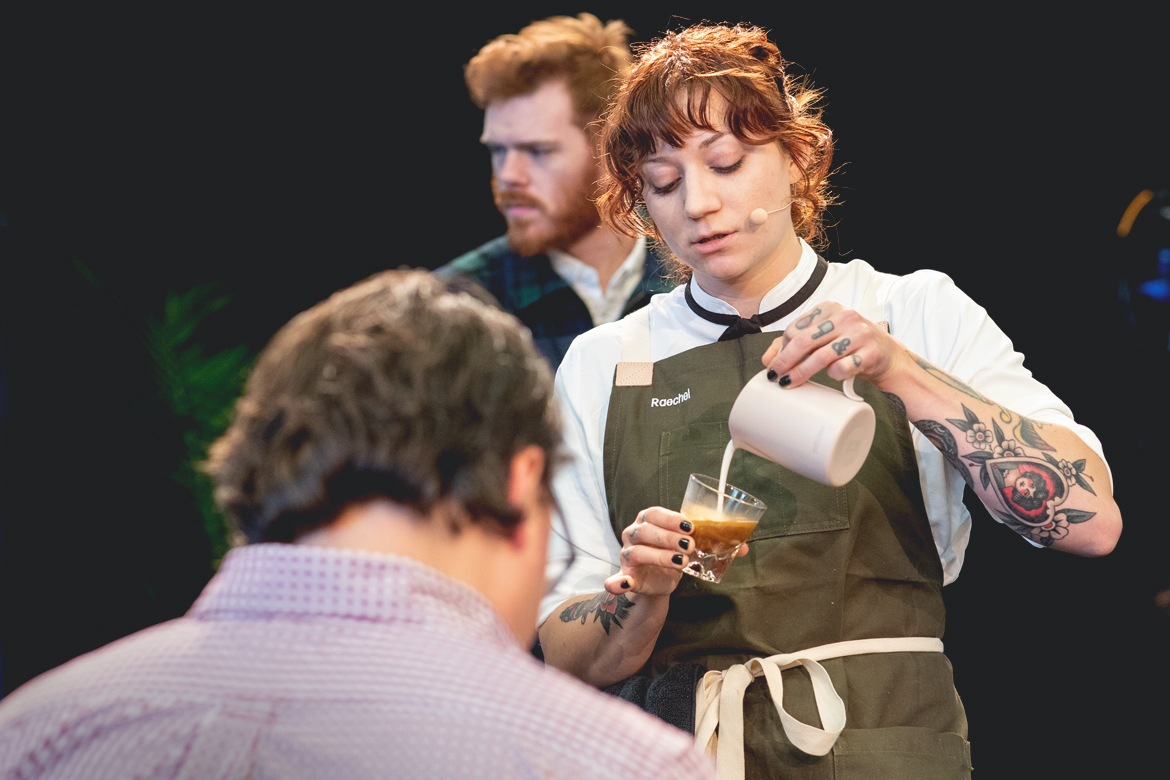
She begins: “Coffee is an infinite puzzle,” before moving into farm and processing details.
Hurd uses a gesha roasted by @onyxcoffeelab, this natural-processed coffee grown at La Palma y el Tucan in Colombia. Grapefruit acidity, fresh fruit medium sweetness, creamy body with medium weight. Flavors of chocolate covered cherries, with white wine minerality.
“Coffee and milk is a classic pairing.” In Raechel’s milk course, a ratio of 3:1 coffee to milk, with notes of ripe peach and vanilla ice cream, with a white chocolate finish.
Raechel’s signature drink uses acid whey, marigold syrup for sweetness and compliment the fresh fruit sweetness of her espresso. Poured over jasmine tea ice cubes, stirred, strained, shaken for texture & served in a rocks glass.
Ryan Wojton, Madcap Coffee Co, Grand Rapids, MI
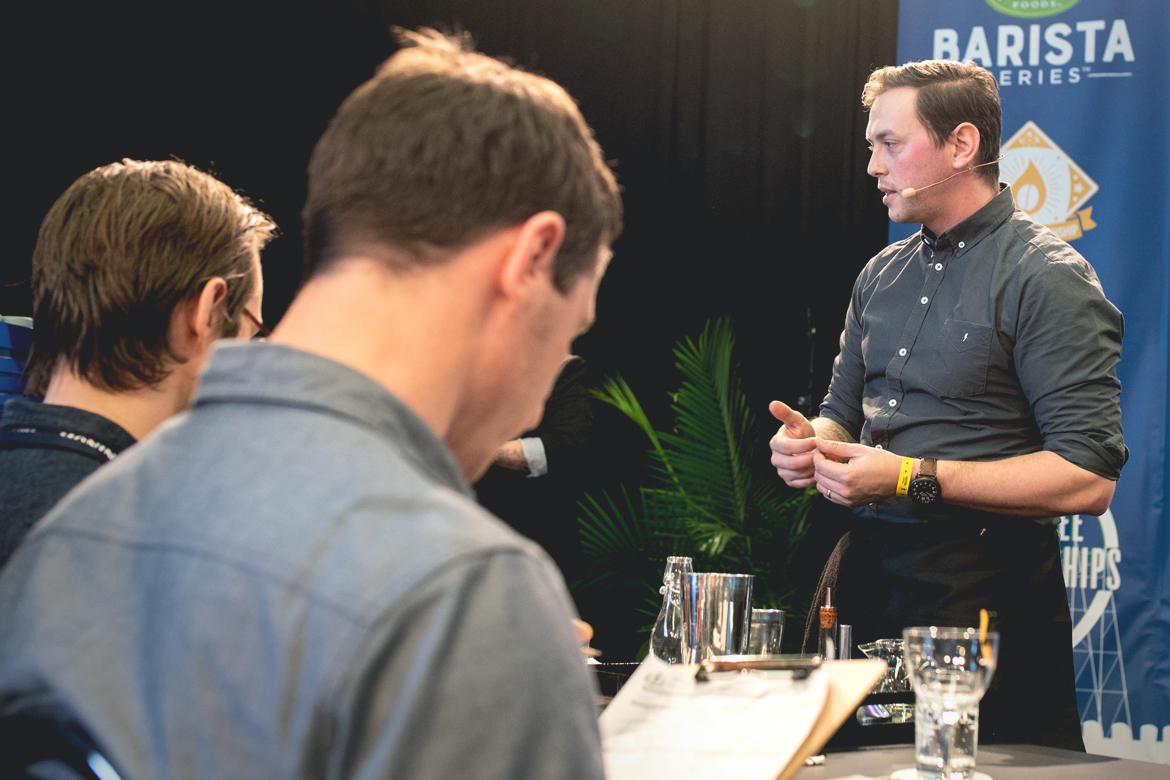
Wojton competes with coffee grown by Luis Reinoso, in Tolima Colombia — a relationship Madcap has had for almost 10 years. “Today we’re going to talk about constant improvement,” begins Ryan, charting his development since his last barista routine 5 years ago.
This espresso is a blend of 80% caturra, 20% bourbon coffee varieties: Wojton notes that these coffees are known for cup quality, comparing the development of Madcap with that of the Reinoso’s.
Sparkling complexity, medium tart cherry acidity. Dry cherry flavors, hint of blood orange and hibiscus. Balanced bitterness like an amaro. Light, silky, body, clean and lingering finish. ← notes for Wojton’s espresso course.
Two parts milk to one part espresso in Ryan’s milk drink, his espresso cuts through the milk to create a dynamic flavor exchange, with notes of orange creamsicle and graham cracker.
Wojton’s signature drink is a recreation and improvement of his signature drink 5 years ago. Using 22g star anise water, 10g gentian root reduction, 3 dashes bitters, shaken with ice and topped with sparkling water to make a drink like a craft cola, then it’s bottled!
Douglas Park, Joyride, Boston, MA
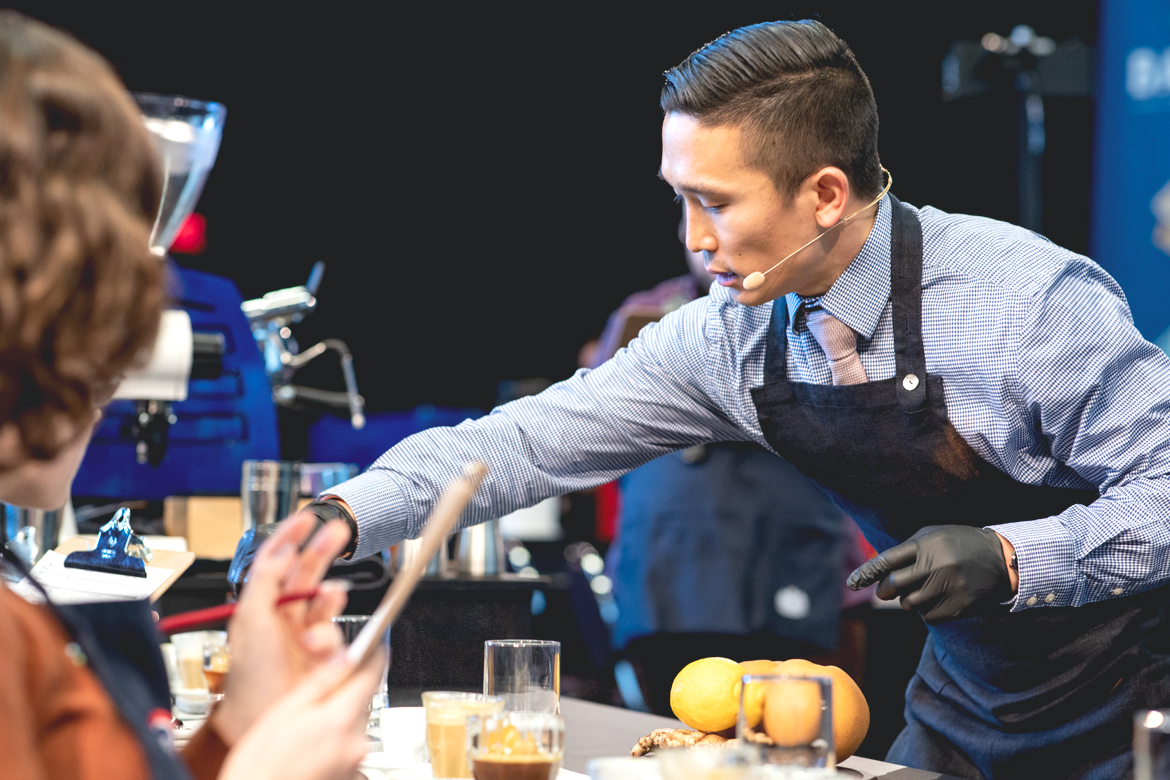
Douglas calmly re-doses a set of shots, and explains to his espresso recipe. This routine has a lot of work upfront, as Douglas correlates the washing of his espresso to crisp fruit flavor.
Jasmine aromatics, sweet lemon, and dried cranberry and basil finish. A crisp clean finish for Mr. Park’s espresso. He’s already pulling a third set of shots before 8:00min. He has to re-prep another portafilter, but has plenty of time.
Douglas’ cortado milk drink uses a longer espresso pour, to give notes of lemon curd with a sweet, lingering finish. There’s a bunch of fruits on the judges’ table just waiting!
Korean pear, lemon, and ginger: ingredients brought from Douglas Korean heritage are the base of his signature drink. The drink is shaken and poured over an ice cube made of Korean pear, finished with lemon peel. As the drink melts, its flavor opens up. Calls time at 14:54!
Rachel Diaz, Flatlands Coffee, Bowling Green, OH
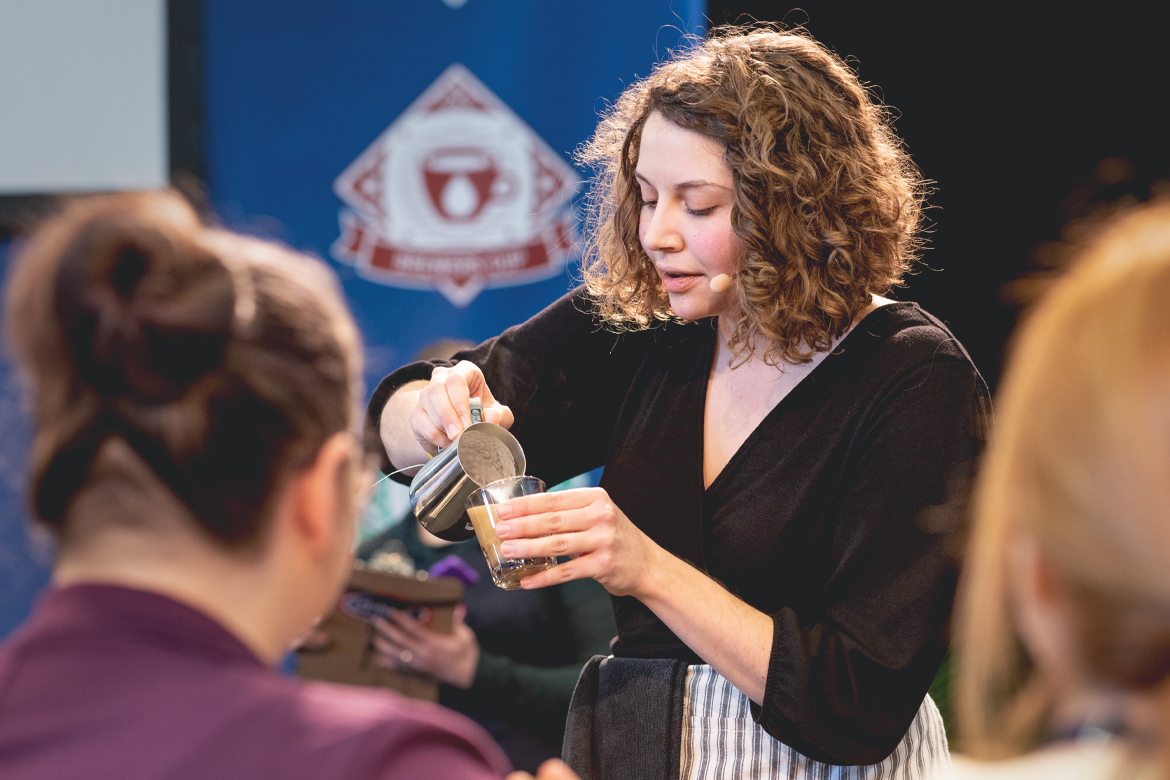
“What an honor it is to be here this weekend in Kansas City,” says Rachel. Another competitor with just 2 years of experience as a barista. She continues, “I’m constantly fascinated by the magic and mystery of this industry.”
Flatlands developed this coffee roast slightly more than they would roast for filter, to highlight sweetness and acidity. 19.5g/45g espresso pour. Tart acidic orange, mellowing into juicy lime and simple syrup. A juicy lingering finish.
Diaz takes a deep dive into milk chemistry and she prepares her milk course, explaining how she took those elements into consideration as she chose a whole-fat milk. A milk from an Ohio farm with slightly lower milk-fat content, from cows with an altered diet.
Rachel worked with a friend whose mixology experience informed her sig bev. Using a pear-rooibos shrub, Kenyan espresso, lemon-ginger water. In her first competition season Rachel finishes just short of 16min, but with a steady and engaging routine.
Kay Cheon, Dune Coffee Roasters, Santa Barbara, CA
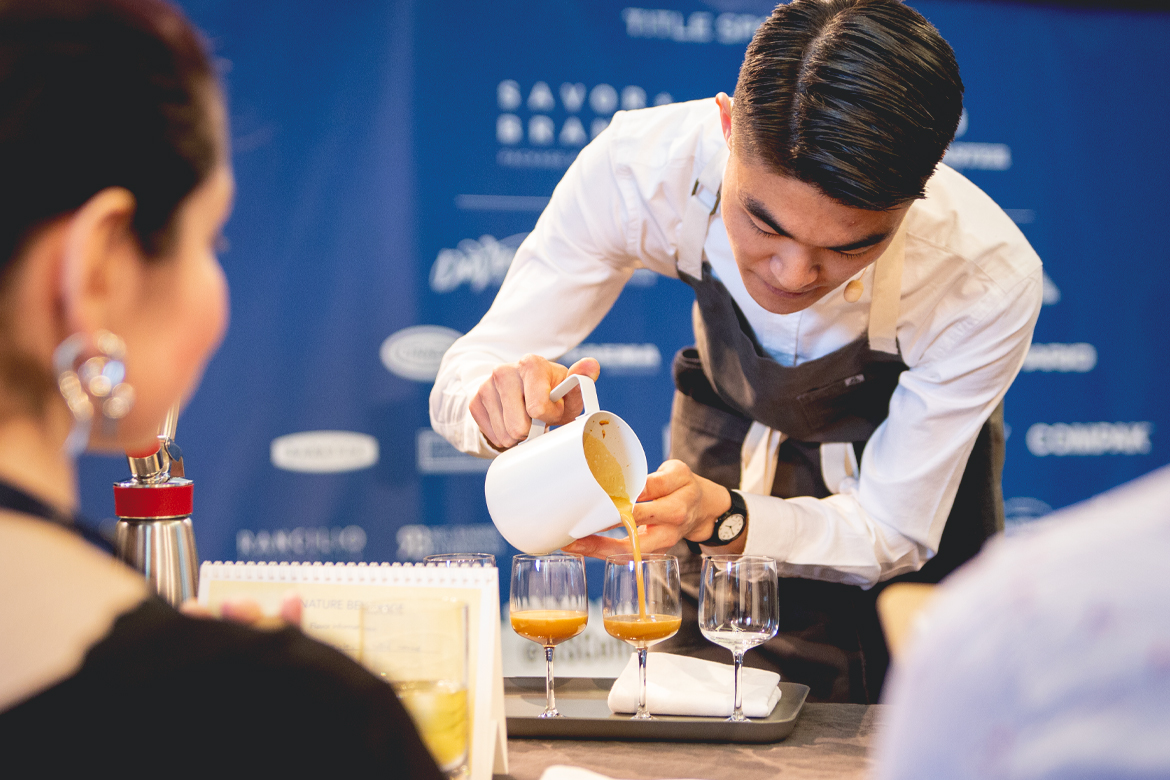
Cheon competes today with a natural processed Typica variety coffee grown by Juan Peña on Hacienda La Papaya.
Cheon has opted to begin his routine with the sig bev. He’s the only competitor thus far to start this way.
Cheon is also the only competitor today to start his routine with Whitney Houston’s “How Will I Know.” It doesn’t matter how loud this song is played, it needs to be played louder.
For his sig bev, Cheon incorporates acid phosphate, fermented honey, Chinese oolong tea infusion, and La Papaya espresso, all nitrous charged and served at room temperature
Milk course today for Cheon is a cappuccino, with notes of strawberry shortcake, poached pear, and chocolate ice cream. Seriously, are there any better flavor calls going right now than in the milk course? Spoiler alert: there aren’t.
Cheon is pulling some of the larger espresso shots in the competition thus far, going with 22g in and 56g out. Notes of raspberry, a tangerine acidity, and 60% dark chocolate.
Juan Diaz, Black & White Coffee Roasters, Wake Forest, NC
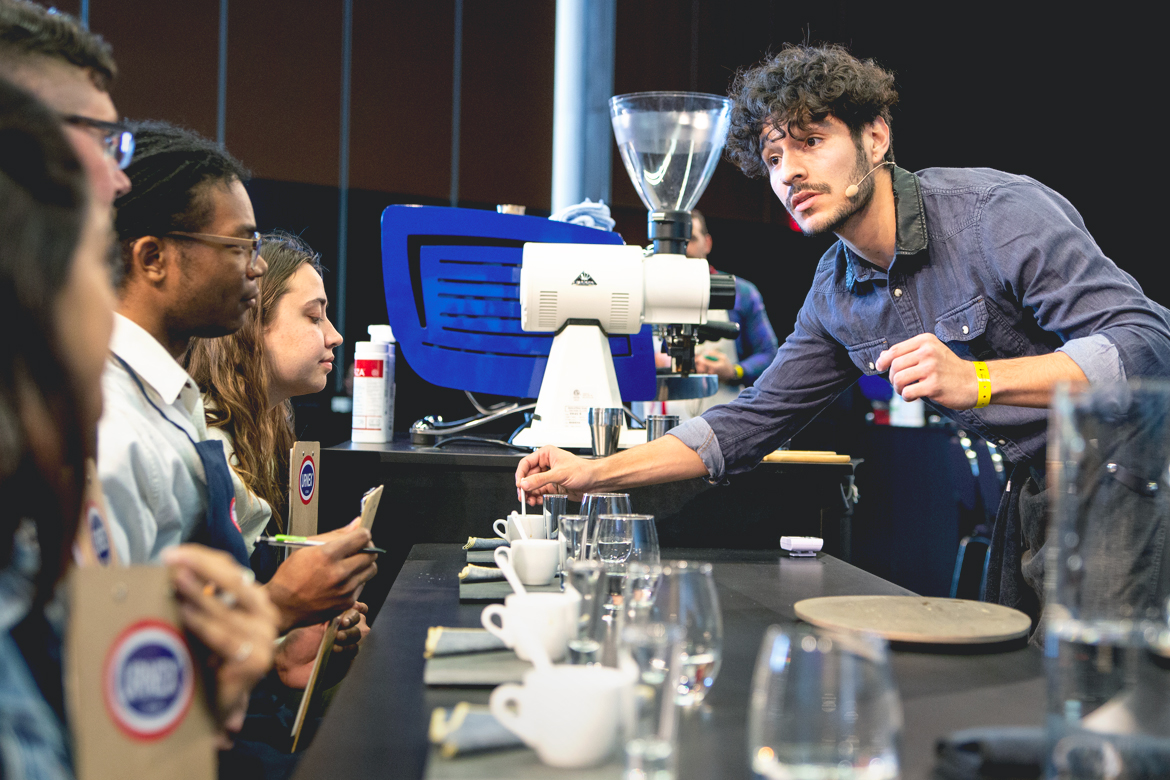
Diaz is starting his service with the milk course, because that’s where he starts any time he is visiting a new shop.
Almond, caramel, and brown sugar turn into milk chocolate with a high percentage cocoa nib finish for Diaz’s macchiato milk course.
Diaz competes today with a 100% Castillo variety lactic acid and anaerobic fermented coffee from @LAPALMAyELTUCAN
Diaz competed with a La Palma coffee at the Nashville qualifiers, and you can expect to see quite a few more competitors using La Palma over the course of the next few days.
For Diaz’s espresso course, the lactic acid La Palma has notes of Rainier cherry, hibiscus, lime, and a cocoa nib finish.
Diaz serves his the judges small glasses of aguapanela, which will serve as the inspiration for his sig bev. Panela simple, hibiscus, pomegranate juice, all blended and finished with a bergamot spritz
Cole McBride, Ada’s Discovery Cafe, Seattle, WA
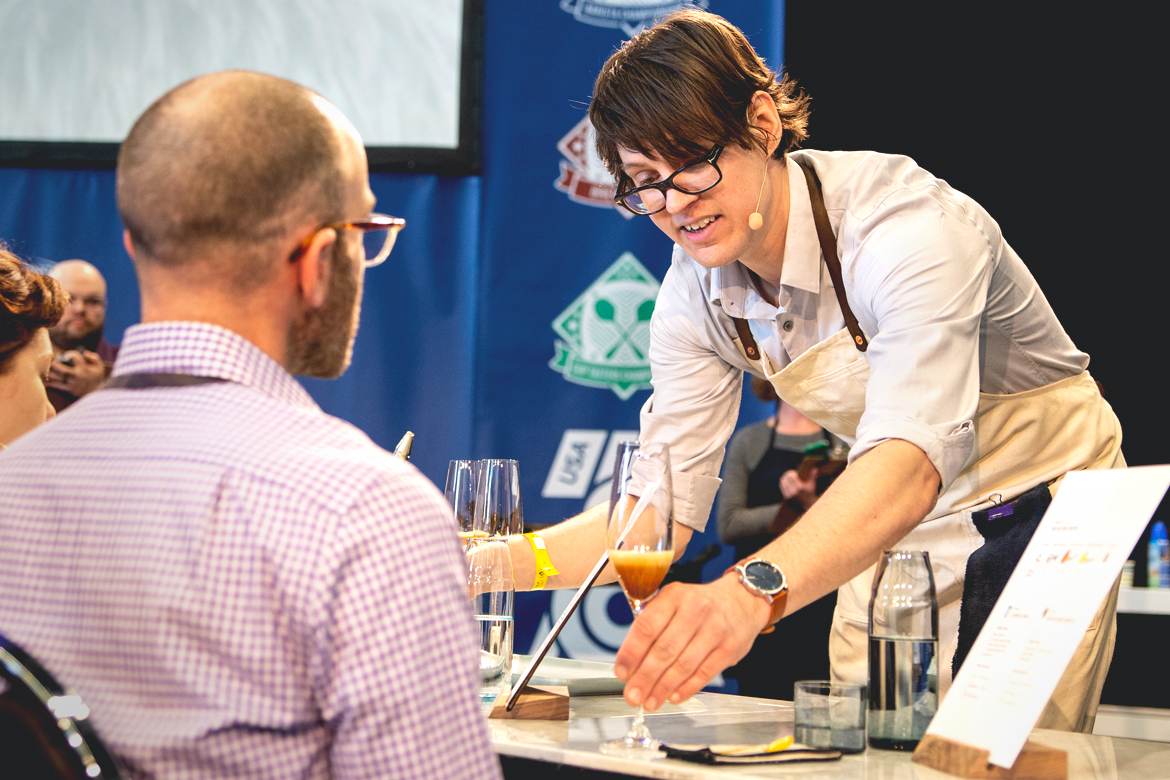
.@colecoffee is the first barista champion in 6 years to return to the competition after winning. The last person to do that? None other than Pete Licata the year he went on to win the World Barista Championship.
Starting off by preparing his sig bev, @colecoffee is using a natural processed Typica from Finca La Papaya in Ecuador, the farm McBride has used for many seasons now.
Sumo citrus, oolong infused sugar, bergamot citrus, and La Papaya spro are all combined and chilling in some sort of dry ice bath while McBride moves on to the milk course.
Changing things up, @colecoffee is serving a blend for his milk course, using the La Papaya roasted by longtime collaborator @veltonscoffee as well as natural processed coffees from Burundi and Yirgacheffe, both roasted by @OlympiaCoffee
Sig drinks are now down for @colecoffee. It’s been a complex dance from McBride thus far: making the sig bev, letting it sit, turning to the milk course using three coffees instead of one, then serving the sig bev.
Fresh nectarine, brown sugar, and toffee in @colecoffee‘s natural processed La Papaya Typica espresso course.
Sam Schaefer, Mockingbird Coffee, Ann Arbor, MI
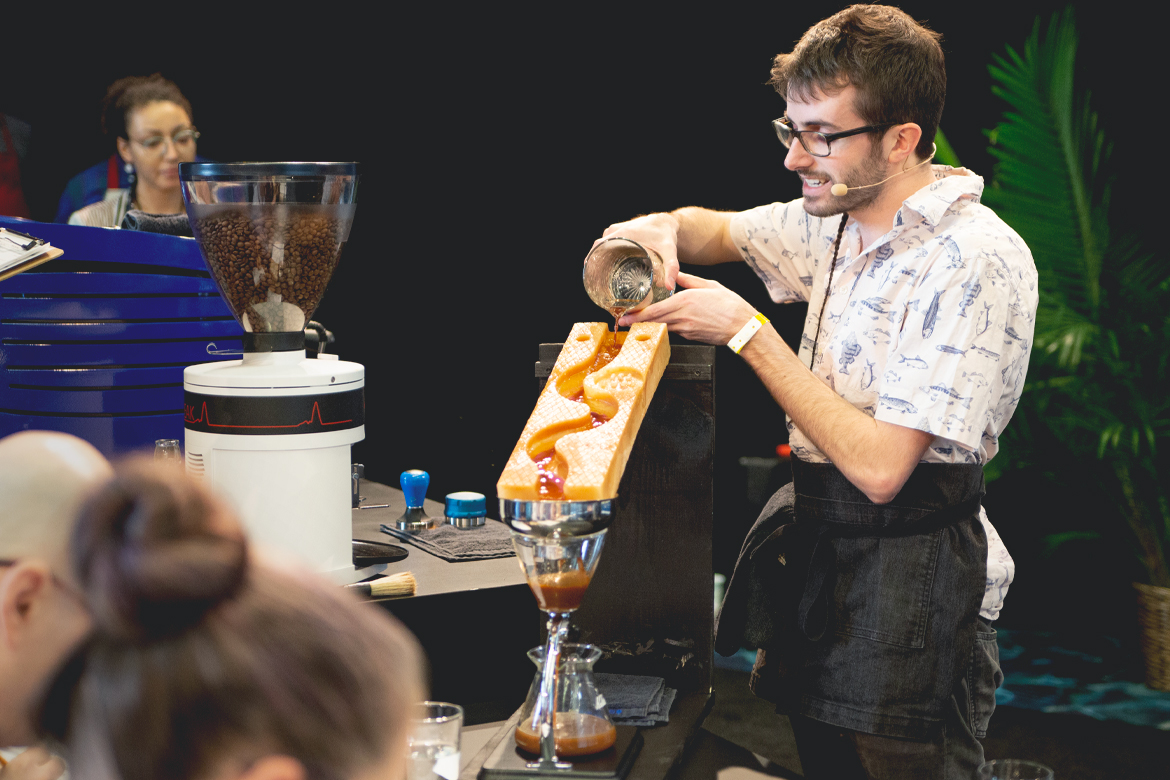
.@2pacshafar kicks things off with the milk course. Schaefer stirs each espresso individually to break up the crema before adding 3oz milk, giving the drink notes of freeze-dried strawberry, brown butter, and dutch cocoa
Using a natural processed 100% Red Catuai variety coffee from Minas Gerais, Brazil, @2pacshafar‘s espresso course has notes of dried tart cherry, orange peel, cherry wood, and amaretto.
.@2pacshafar stirs the espressos for each of his judges. He is the second competitor today to do that today.
.@2PACSHAFAR IS BUSTING OUT THE SHOT LUGE! A giant fresh squeezed lemon juice and star anise comprises the giant ice block/waterfall. Espresso, fig, and maple syrup take a ride down the waterfall into a waiting maple sap soda.
Gisel Alvarez, Monarch, Kansas City, MO
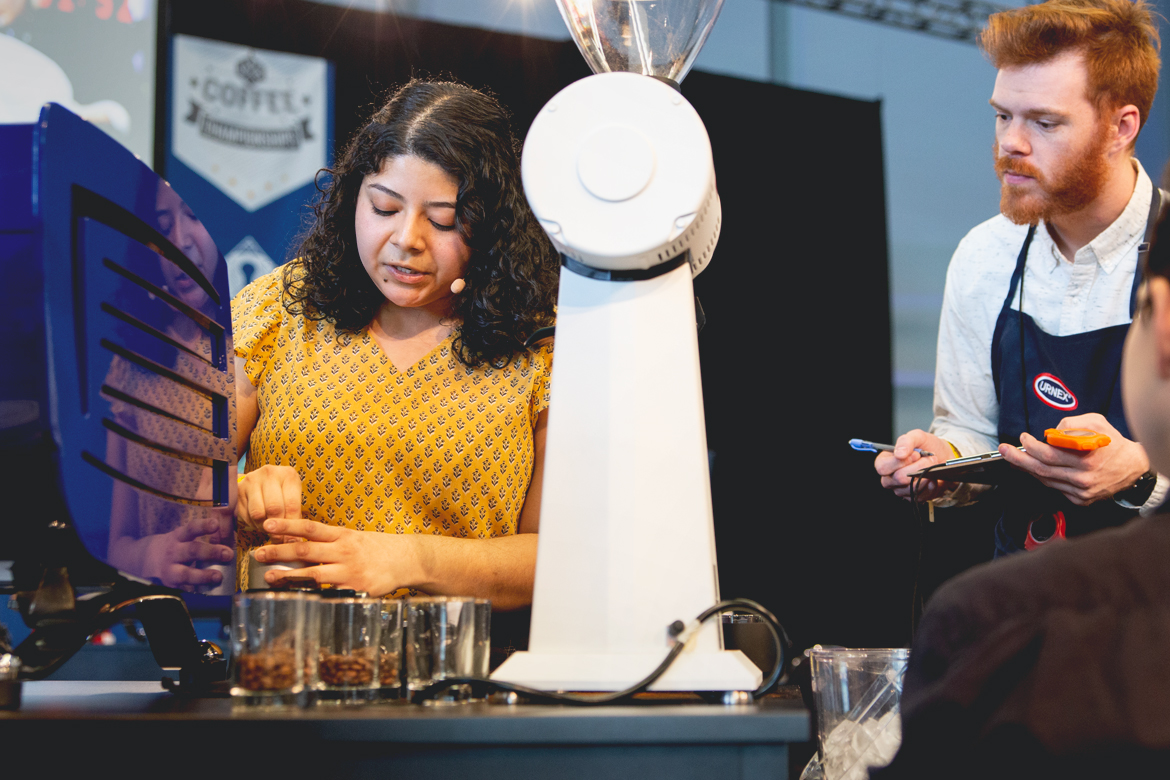
Alvarez is competing today with a cold-fermentation processed Pink Bourbon grown by Rodrigo Sanchez on Finca Monteblanco in Huila, Colombia.
The Pink Bourbon espressos for Alvarez have a peach-like acidity, honeysuckle sweetness, and grapefruit bitterness.
Has anyone ever noticed how the inner piece of those EK43 dosing tools looks like the totem from Inception? How long do you think they could spin? Is this a dream?
3:1 milk to espresso ratio in Alvarez’s milk course, the drink has notes of vanilla, almond, and berries and cream.
For her sig bev, Alvarez incorporates espresso and pineapple simple, chilled, topped off with tonic, finished off with a raspberry, white tea, rose, and egg white foam.
Shane Hess, Jubala Coffee, Raleigh, NC
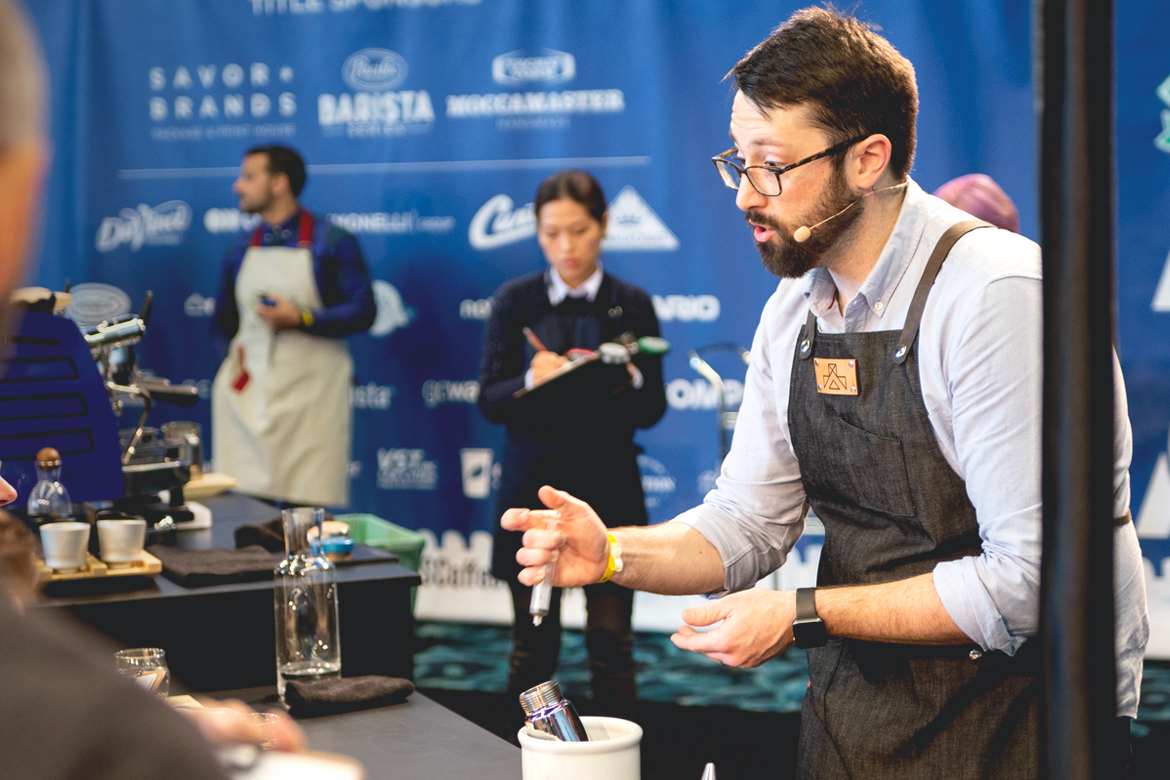
Shane Hess is bringing back the meditative soundtrack. It’s very chill in here.
Hess competes with an anaerobic fermented Gesha from @LAPALMAyELTUCAN in Colombia, processed in two different ways: natural and honeyed.
Bathe me in the Shane Hess sound bath. I’m ready to be cleansed.
Magnolia, clementine, nectarine, with a dry riesling acidity for Hess’ honey processed La Palma Gesha espresso course.
For his milk course, Hess is using a freeze condensed milk to pair with the natural processed La Palma espresso.
Switching back to the honeyed Gesha, Hess is using lactic acid infused Muscadine grape, honeysuckle simple, and sherry vinegar, all nitro charged.
Maxwell Mooney, Narrative Coffee, Everett, WA
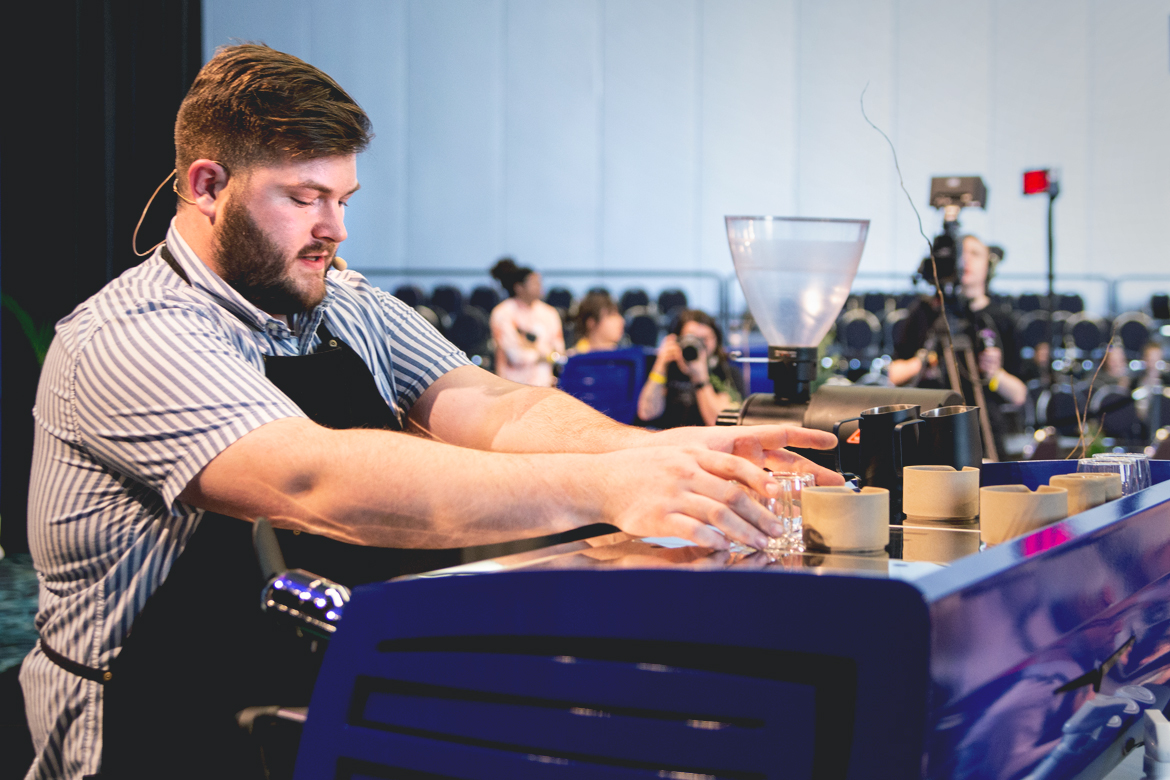
“It’s my responsibility as a father to take dad jokes very seriously.” Same Maxwell. Same.
Mooney is rekindling one of his first loves in coffee: natural processed Ethiopias. He competes today with a natural Hambela from the Guji Zone.
Raspberry, blood orange, and cacao in Mooney’s natural Hambela espresso course here at #uscoffeechamps.
Mooney is also using freeze concentrated milk, or “super milk” as he calls it, “as if milk hit the gym.”
Macchiato milk course for Mooney has notes of whipped nougat and Bit O’ Honey.
For his sig bev, Mooney incorporates peach juice, pomegranate juice, “super milk,” tart cherry juice, and apple wood smoke, all nitrogenated together.
Hana Kaneshige, Counter Culture Coffee, Los Angeles, CA
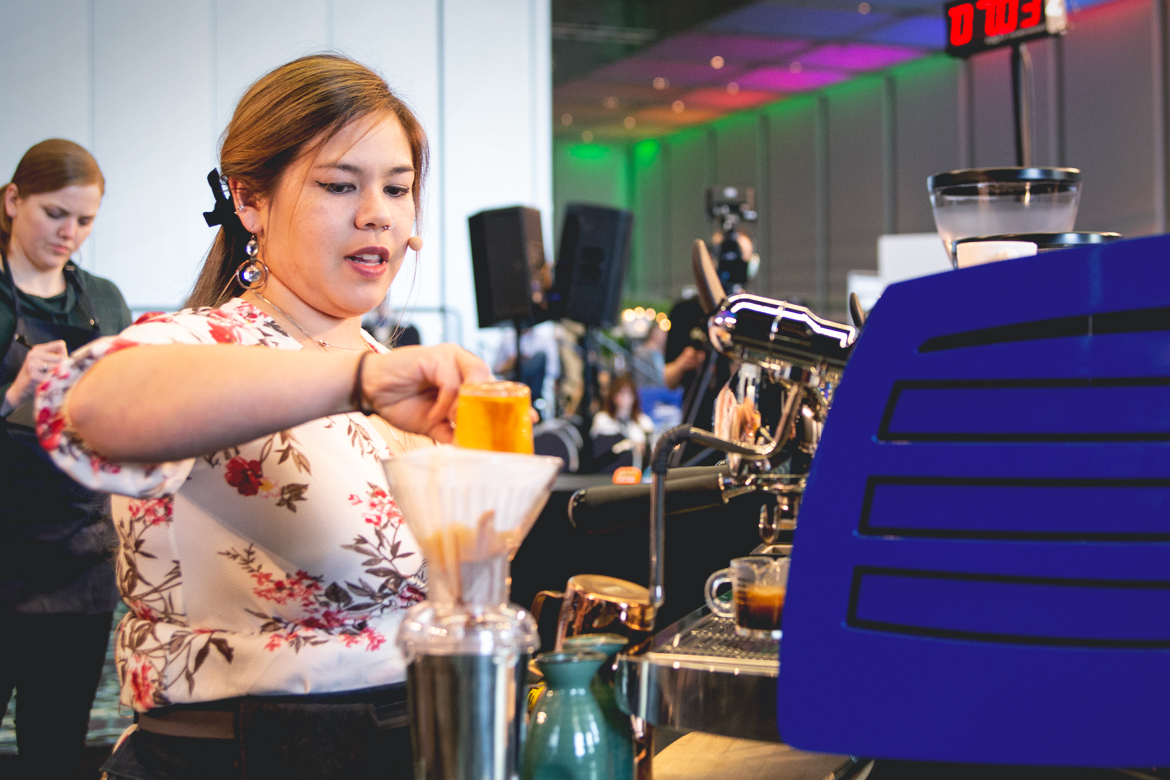
Kaneshige competes with a natural processed Burundi from producer Ramadhan Salum at the Buziraguhindwa processing station.
Kaneshige is the third competitor today to use a natural processed Burundi. Hers has notes of fresh blackberry, plum, and cranberry.
What are those beautiful purple ice cubes Kaneshige has for her sig bev?
MINT RED BASIL ICE CUBES! Kanashige’s purple ice cubs are the base of her cascara and guava and passionfruit juice-based sig bev.
Oooo Kaneshige is switching up her coffee for the milk course, but she is making the judges taste it blind. No origin hints here.
Buttery pound cake, dark chocolate, and caramel in Kanashige’s cappuccinos, made with 6% fat milk.
Matthew Barahura, Intelligentsia Coffee, San Diego, CA
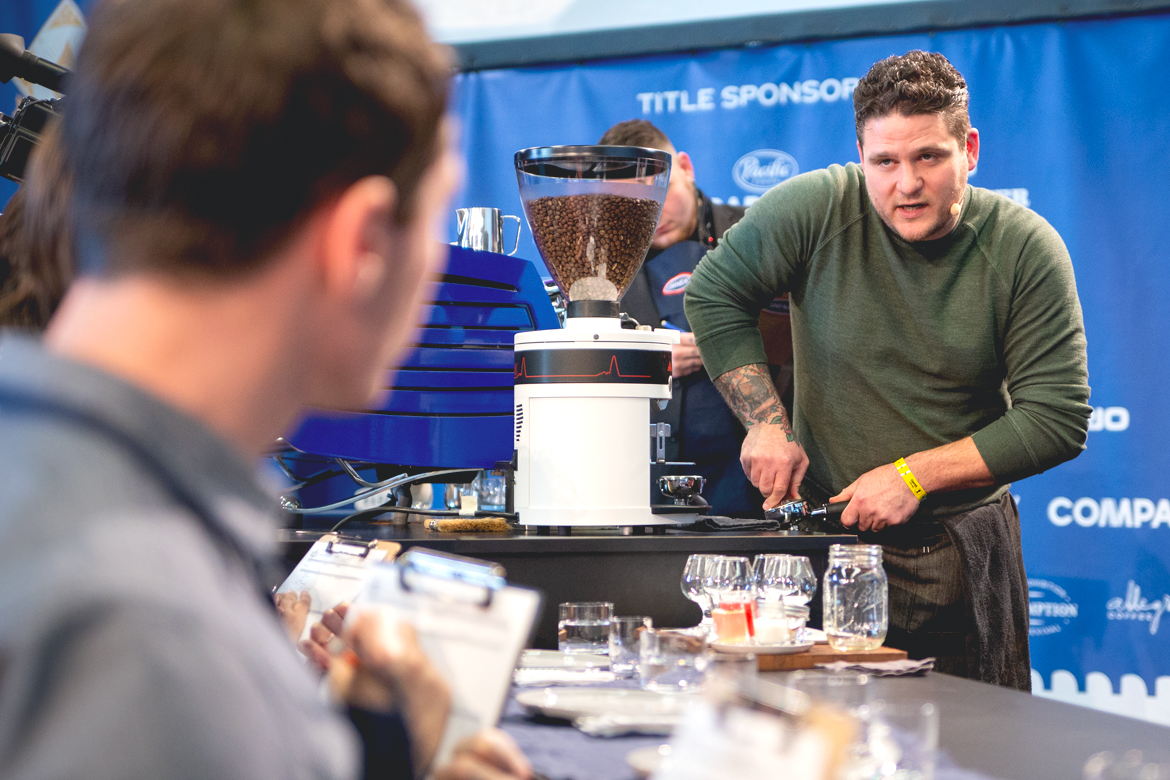
“Failing sucks” — Barahura starts his set while @fleetwoodmac‘s “Little Lies” plays, a statement that is in no way a lie.
Barahura competes with a wash processed coffee from METAD, a producer in Ethiopia’s Guji Zone.
For the milk course, Barahura’s METAD coffee expresses notes of dehydrated apple rings, almond butter, and nilla wafer.
Barahura is currently fresh cutting leaves off a small rue plant that grows wild in Yirgacheffe. The producer states that he can always tell his coffee on a cupping table because of the rue that grows around it.
Cold brew hop tea, dried cranberry infusion, and espresso all get dry shaken together to create a sig bev reminiscent of the rue.
Joel Bigelow, Messenger Coffee, Kansas City, MO
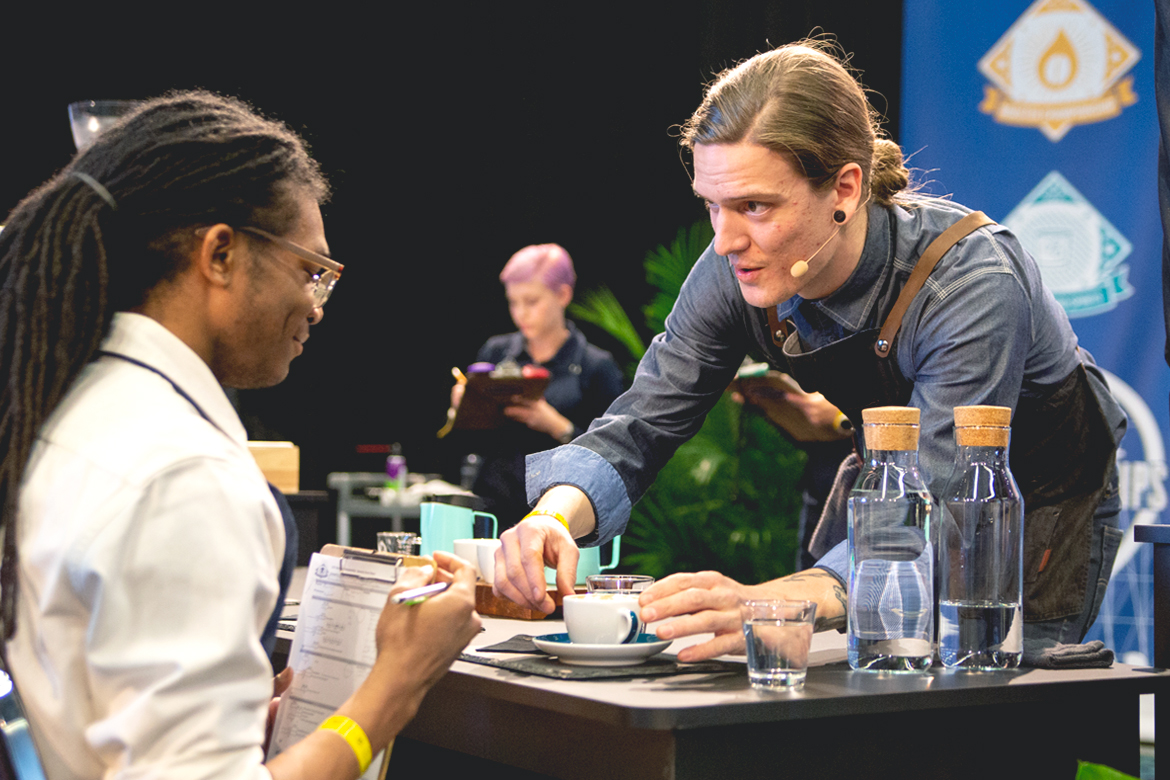
Can you believe it? We’re already at our last competitor of the day, Joel Bigelow of Messenger Coffee in Kansas City, MO
.@thejoelpaul competes with a natural processed grown in Bensa by the Bombe Mountains in the Sidamo region of Ethiopia.
Notes of tangerine, tart raspberry, blackberry, and dark chocolate in @thejoelpaul‘s espresso course.
Tangerine and nectarine are heavy favorites to be the flavor call of this year’s Barista Championship. They are neck and neck right now.
Sig bev for @thejoelpaul starts off with frozen, smoked, macerated strawberry syrup and heavy cream and gently bruised cara cara orange dried shaken, layered with espresso, and finished off with freeze-dried blackberry powder
Pink starburst and cuties mandarin orange flavor calls for @thejoelpaul‘s sig bev. i love both of those things.
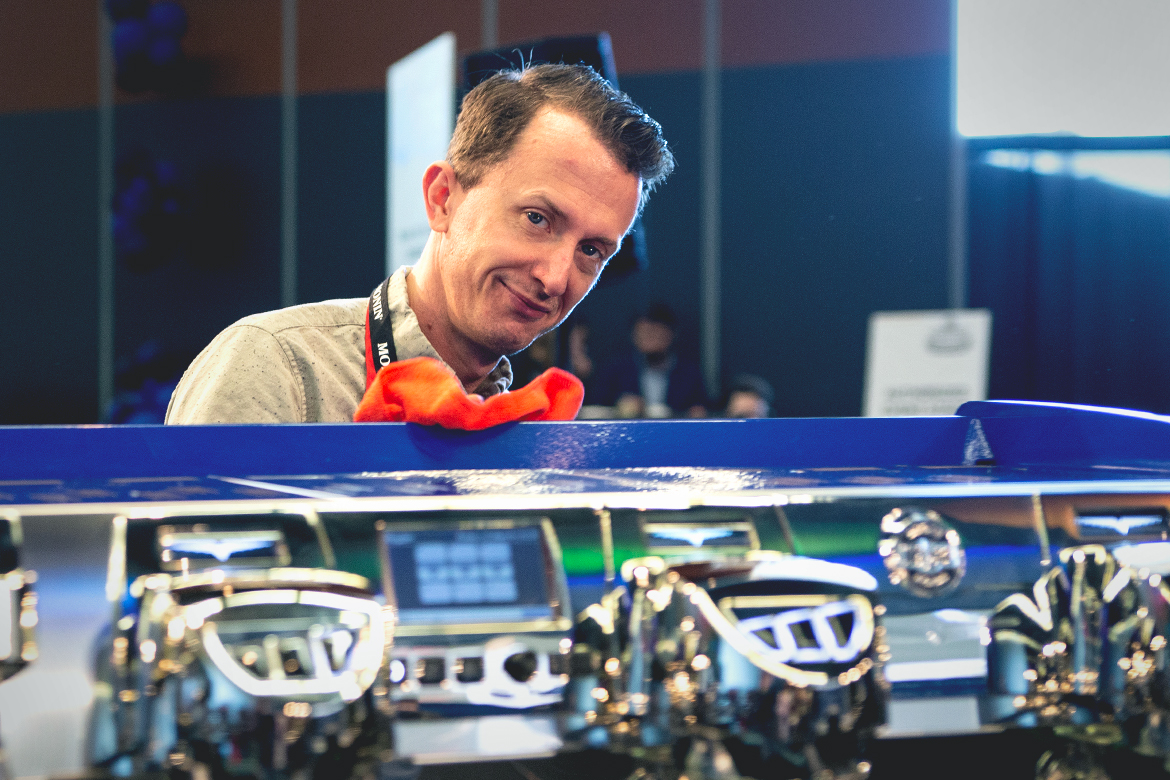
Tune in tomorrow for live coverage of the US Barista Championships Semi-Finals
